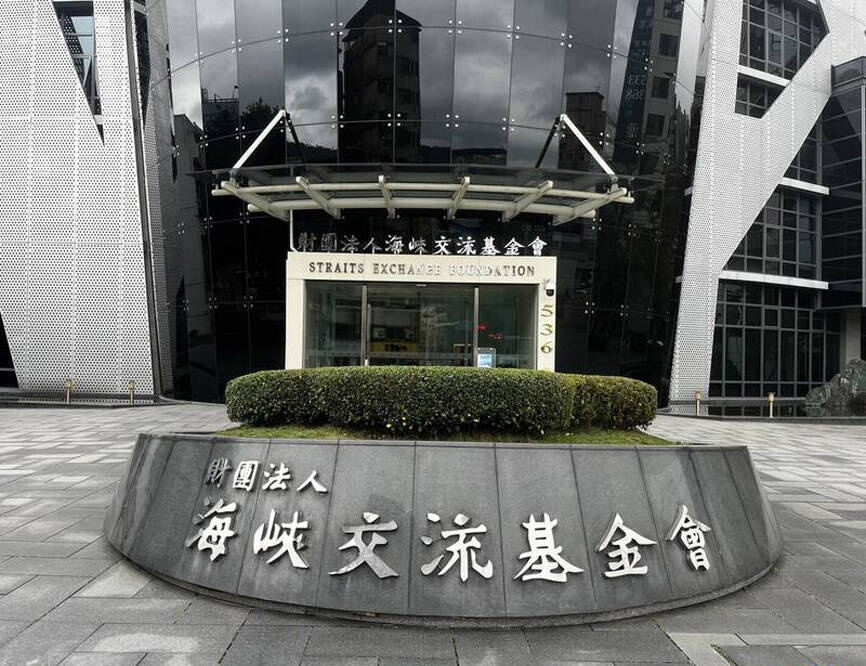The Straits Exchange Foundation (SEF) yesterday urged the public to be aware of China’s increasing censorship of publications after Beijing seized shipments of Taiwanese textbooks for contradicting the “one China” principle.
The Chinese General Administration of Customs recently wrote on Sina Weibo that its Fuzhou branch had confiscated three books shipped from Taiwan due to “problematic maps” showing Taiwan as a country and not recognizing Beijing’s claims in the South China Sea.
The books “contravened the ‘one China’ principle and severely endangered national unification, sovereignty and territorial integrity,” it said.

Photo: Taipei Times
A video published by the agency suggested the confiscated material were Taiwanese history and geography textbooks designed for junior-high school students.
The SEF said that Beijing continues to use cultural and educational exchanges between the two sides of the Taiwan Strait to further its efforts to impugn Taiwan’s sovereignty.
Taiwanese should understand that the Chinese government is not a democracy and has nothing in common with Taiwan’s free society, it said, adding that people who work, travel or do business in China should exercise caution.
Chinese customs has cranked up censorship regarding printed materials revolving around China’s territorial claims, it said.
Customs officers in Nanning, China, seized maps that did not label islands in the South China Sea as Chinese territories and textbooks of Hong Kong students traveling in China were destroyed, the SEF said.
Textbooks mailed or carried by Taiwanese and Hong Kongers have been increasingly been confiscated or destroyed by Chinese customs officials, the SEF said.
Taiwan operates schools in China’s Shanghai, Guangdong and Jiangsu, which rely on textbook shipments from Taiwan that have been affected by Chinese censorship, it said.
The schools have arranged for Taiwanese students to receive remedial lessons in Taiwan during the summer and winter vacations, as censorship has made many subjects impossible to teach, it said.
Chinese Nationalist Party (KMT) Legislator Lai Shyh-bao (賴士葆) called Beijing’s book seizures an overreaction, saying that Chinese authorities were “making a big deal out of nothing.”
Taiwanese schools in China have annually sent textbooks by mail for use without harassment until now, he said, adding that Beijing might have confiscated the books for significant changes in content or some ulterior motive.
Asked if the textbook seizures were part of China’s “united front” efforts, Lai said there was no need to dwell on the subject, as Taiwanese schools in China are subject to Chinese laws.

Chinese Nationalist Party (KMT) Chairman Eric Chu (朱立倫), spokeswoman Yang Chih-yu (楊智伃) and Legislator Hsieh Lung-chieh (謝龍介) would be summoned by police for questioning for leading an illegal assembly on Thursday evening last week, Minister of the Interior Liu Shyh-fang (劉世芳) said today. The three KMT officials led an assembly outside the Taipei City Prosecutors’ Office, a restricted area where public assembly is not allowed, protesting the questioning of several KMT staff and searches of KMT headquarters and offices in a recall petition forgery case. Chu, Yang and Hsieh are all suspected of contravening the Assembly and Parade Act (集會遊行法) by holding

PRAISE: Japanese visitor Takashi Kubota said the Taiwanese temple architecture images showcased in the AI Art Gallery were the most impressive displays he saw Taiwan does not have an official pavilion at the World Expo in Osaka, Japan, because of its diplomatic predicament, but the government-backed Tech World pavilion is drawing interest with its unique recreations of works by Taiwanese artists. The pavilion features an artificial intelligence (AI)-based art gallery showcasing works of famous Taiwanese artists from the Japanese colonial period using innovative technologies. Among its main simulated displays are Eastern gouache paintings by Chen Chin (陳進), Lin Yu-shan (林玉山) and Kuo Hsueh-hu (郭雪湖), who were the three young Taiwanese painters selected for the East Asian Painting exhibition in 1927. Gouache is a water-based

Taiwan would welcome the return of Honduras as a diplomatic ally if its next president decides to make such a move, Minister of Foreign Affairs Lin Chia-lung (林佳龍) said yesterday. “Of course, we would welcome Honduras if they want to restore diplomatic ties with Taiwan after their elections,” Lin said at a meeting of the legislature’s Foreign Affairs and National Defense Committee, when asked to comment on statements made by two of the three Honduran presidential candidates during the presidential campaign in the Central American country. Taiwan is paying close attention to the region as a whole in the wake of a

OFF-TARGET: More than 30,000 participants were expected to take part in the Games next month, but only 6,550 foreign and 19,400 Taiwanese athletes have registered Taipei city councilors yesterday blasted the organizers of next month’s World Masters Games over sudden timetable and venue changes, which they said have caused thousands of participants to back out of the international sporting event, among other organizational issues. They also cited visa delays and political interference by China as reasons many foreign athletes are requesting refunds for the event, to be held from May 17 to 30. Jointly organized by the Taipei and New Taipei City governments, the games have been rocked by numerous controversies since preparations began in 2020. Taipei City Councilor Lin Yen-feng (林延鳳) said yesterday that new measures by